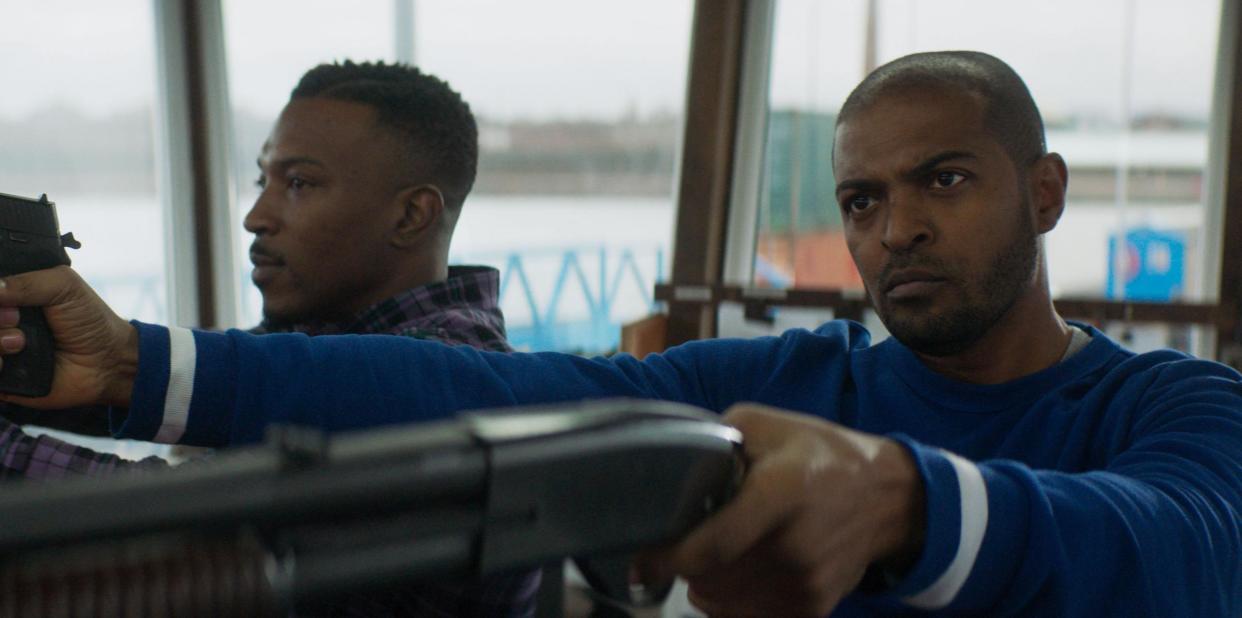Bulletproof misfires with its glamorisation of gun culture and representation of Britain

Sky One’s Bulletproof came to a close this week and while it has already had a second series confirmed, the show rather naively addresses a variety of issues and misrepresents life in the UK as a gun-centric world of violence crime.
Over its six episodes we get to know policing duo Bishop and Pike – played by Noel Clarke and Ashley Walters, respectively – but the feeling one gets is that the programme would rather you see it as an American-style buddy cop show than anything resembling British life.
Read more: Bulletproof’s debut is standard buddy cop formula but leaves the door open
Packaging it as such feels totally out of place, with its salacious attitude to guns and violence you’d be forgiven for thinking this was an LA-based drama rather than something around the grimy streets of London.
With another six episodes greenlit it appears people tuned in so Sky bosses deemed it financially viable for a sophomore season, but that doesn’t mean it deserves one because Bulletproof couldn’t be further away from reality if it tried.

It’s as if Clarke sat down and wrote (the first episode, at least) it when he was a teenager, incorporating all the elements a boisterous young lad would want to see happen in a programme, after having watched the likes of Lethal Weapon one too many times.
Despite Clarke conceiving (alongside co-star Walters), writing, and headlining the series, it’s Nick Love’s direction and subsequent writing on a bulk of the episodes that set the standard – and it’s not a high one from the mind that penned The Football Factory and The Business.
Gun glamorisation is the strongest recurring theme here – even more dominant than the intended partnership between Bish and Pike. Britain isn’t riddled with gun crime and shootouts but that’s what Bulletproof would have you believe.
Someone watching any number of the intense and extremely loud The Dark Knight-inspired jail breaks or Heatesque machine gun battles would be forgiven for assuming the UK is a violent, dangerous place brimming with corruption and gang warfare, whereas the real side is that guns are something of an anomaly and knife crime, if anything, is the common assault of choice – yet this programme wouldn’t want you thinking that nor would it be as visually entertaining.

And that’s where its biggest and more irresponsible problem lies: its depiction is so skewered that this sacrifices any semblance of realism and reflection of working-class Britain or the nature of its criminal underbelly for a preferred Hollywoodisation of guns, girls, fist fights, and unbelievably laddish banter.
There’s also underlying issues of angry young men using their fists and trigger-happy tendencies to get things done. Clarke’s Bishop is a defensive and mostly closed book in the manner he deals with his own feelings and emotions.
It’s all to an unhealthy level, in fact, as he conforms to a typical male bravado of being too tough to experience love or heartbreak, let alone show it. Walters’ Pike, fortunately, is a little more expressive and wears his heart on his sleeve, yet when you couple Bishop’s dominating attitudes with the recurring themes of anger, guns, and fighting it treads a dangerous path of toxic masculinity.

American shows are held less accountable in acceptable standards and morals because guns are sadly a massive part of their culture and way of life. Their high levels of gun crime and murder rates is understandably (but not always morally) incorporated into US films and shows but that shouldn’t translate to UK shores. America’s license (as it were) to carry and use guns anywhere and everywhere as a part of every day life is a reflection of who they are – but it’s not who we are.
While some would argue that the idea of escapism is paramount to an audience’s ability to immerse themselves in a fictional world – which this certainly is – there are more effective ways to do it than producing firearms at every turn as a means of progressing the plot and as a way of solving problems rather than, I don’t know, using rational, non-violent measures.
Series one tries too hard to sensationalise. Whether it’s an uncovering of an intricate police corruption scandal, child trafficking, or something as straightforward as an out-of-office relationship, the violence and gun-loving crowd it attracts therefore has to include these elements of punching people, having sex, or shouting uncontrollably.
Its ideas of vigilantism, lack of consequences, and gung-ho approach renders the programme problematic. Logistically it’s all over the place, meaning Clarke’s largely unlikeable and abrasive character can waltz into known criminal territory and murder someone without so much as an investigative query.

The misrepresentations going on here don’t do the UK-based series any justice. Its lack of finesse and subtlety, mixed with misogynistic overtones, or ‘boys in charge’ attitude can also be viewed unfavourably.
There is, however, one solitary moment at the finale’s close that manages to tap into a pocket of emotion. It’s a sad, uplifting point that eventually displays a glimpse of Bishop’s character but much like the entire show itself, is too little too late as it’s sandwiched between a spoon-fed, lazily written stack of plot that wants to be as appealing as Luther or even The Shield but comes across as a knock-off version of The Bill.
Catch series one of Bulletproof on Sky catch up services now.
Read more:
The Handmaid’s Tale: Has June been irreversibly broken by recent events?
Netflix including Jeffrey Tambor in Arrested Development is problematic
Amazon’s Lord of the Rings series is destined to fail

 Yahoo Movies
Yahoo Movies 
